
Kotpuli, also known as Kotpuliyar and Kotpuli Nayanar, was a Nayanar saint, venerated in the Hindu sect of Shaivism. He is generally counted as the fifty-seventh in the list of 63 Nayanars.
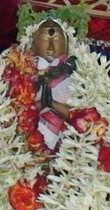
Apputhi Adigal, also spelt as Apputhi Adikal, Atputhi Adigal, Apputi Adigal, Appoodi Adikal, Appoothi Adikal and Appudhi Adigal and known as Appuddi Nayanar, was a Nayanar saint, venerated in the Hindu sect of Shaivism. He is generally counted as the twenty-fifth in the list of 63 Nayanars. He is described as a contemporary of Appar or Thirunavukkarasar, one of the most prominent Nayanars.

Sakkiya Nayanar was a Nayanar saint, venerated in the Shaiva sect of Hinduism. He is generally counted as the thirty-fourth in the list of 63 Nayanars. He was a crypto-Hindu posing as a Buddhist, practicing Shaivam in secrecy. He was reported to have worshipped Lord Shiva, his patron god, by hurling stones at his iconography.
Satti Nayanar, also known as Satti (Sathi), Sathiyar, Shakti Nayanar, Shakti, Shaktiyar (Saktiyar), Sattiyandar and Thiru-Saththi Nayanar, is a Nayanar saint, venerated in the Hindu sect of Shaivism. He is generally counted as the 45th in the list of 63 Nayanars. Satti Nayanar is described to cut off the tongue of whoever talked ill of his patron god Shiva or Shiva's devotees.

Murkha Nayanar, also known as Moorka Nayanar, Murka Nayanar, Moorkha Nayanar, Murgga Nayanar, Moorkka Nayanar and Murkhar, is a Nayanar saint, venerated in the Hindu sect of Shaivism. He is generally counted as the thirty-second in the list of 63 Nayanars.

Nami Nandi Adigal, also spelt as Naminandi adigal, Naminandi adikal and Naminanti Atikal, and also known as Naminandi and Naminandhi, is a Nayanar saint, venerated in the Hindu sect of Shaivism. He is generally counted as the 27th in the list of 63 Nayanars.
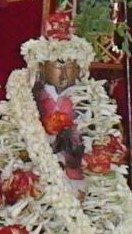
Somasi Mara Nayanar, also known as Somasi Maranar, Somasi Marar, Somasimarar and Somasira Nayanar, is a Nayanar saint, venerated in the Hindu sect of Shaivism. He is generally counted as the thirty-third in the list of 63 Nayanars. He is also called Marar, Maran and Mara Nayanar, names he shares with Ilayankudi Mara Nayanar. The two Nayanars are generally differentiated by the prefixes "Somasi" and "Ilayankudi". He was a contemporary and devotee of Sundarar.

Isaignaniyar, also spelt as Isainaniyar, Isaignaniyaar, Isaignaniar and Isaijnaniyar and also known as Isai-jnani Ammaiyar, is the mother of Sundarar, one of the most prominent Nayanar saints. She is herself regarded as a Nayanar saint, venerated in the Hindu sect of Shaivism, along with her husband Sadaiya Nayanar. She is generally counted as the last in the list of 63 Nayanars.

Sadaiya Nayanar or Sadaiyar is a 7th century Nayanar saint in the Hindu sect of Shaivism, venerated for being father of the prominent saint Sundarar rather than for individual merit. He and his wife Isaignaniyar are generally counted as sixty-second and sixty-third on the list of the sixty-three Nayanar saints. Sundarar is the only Nayanar with both parents venerated.
Viralminda Nayanar, also known as Viranmindar (Viranmintar), Viranmintan and Viranminda Nayanar, is a Nayanar saint, venerated in the Hindu sect of Shaivism. He is generally counted as the sixth in the list of 63 Nayanars. He was a contemporary of Sundarar. He along with Cheraman Perumal Nayanar are the two Nayanars from Kerala. Viralminda Nayanar is described in legends as the reason Sundarar composed a hymn to the Nayanar saints, which became the first compilation of the list.
Eyarkon Kalikkama Nayanar, also known as Kalikkamanar, Kalikamba Nayanar, was a King of Haihaya (Eyar), Commander-in-chief of the Chola army, a Nayanar saint, venerated in the Hindu sect of Shaivism. He is generally counted as the 29th in the list of 63 Nayanars.

Sirappuli Nayanar, also known as Sirappuli, Sirapuli Nayanar, Sirappuliyar (Chirappuliyar), was a Nayanar saint, venerated in the Hindu sect of Shaivism. He is generally counted as the thirty-fifth in the list of 63 Nayanars. Sirappuli Nayanar is described to have served the devotees of the god Shiva and worshipped the god with various ritual practices.

Seruthunai Nayanar, also known as Seruthunai, Seruthunaiyar and Seruttunai Nayanar, was a Nayanar saint, venerated in the Hindu sect of Shaivism. He is generally counted as the 55th in the list of 63 Nayanars.
Nesa Nayanar, also known as Sivanesa Nayanar, Neca Nayanar, Nesanar, Nesar and Nesan (Necan), was a Nayanar saint, venerated in the Hindu sect of Shaivism. He is generally counted as the fifty-ninth in the list of 63 Nayanars. Nesa Nayanar is described to be a weaver, who was always engrossed in remembering his patron god Shiva and gifting clothes he knit to devotees of the deity.
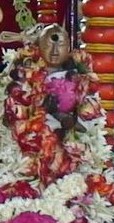
Pugazh Thunai Nayanar, also known as Pugazhthunai Nayanar, Pugalthunai Nayanar, Pukazhtthunai Nayanar, Pukazhtthunaiyar and Pukalttunai, was a Nayanar saint, venerated in the Hindu sect of Shaivism. He is generally counted as the fifty-sixth in the list of 63 Nayanars.

Kutruva Nayanar, also known as Kootruva , Kutruva, Kutruvar, Kootruvar, Kurruva Nayanar, Kurruvar, Kurruvan, Kutruvanar, Kurrrruvar, Kalappallan and Kalappalar, was a chieftain of Kalandai and a Nayanar saint, venerated in the Hindu sect of Shaivism. He is generally counted as the 39th in the list of 63 Nayanars. Kutruva is often described as a Jain, who became a devotee of Shiva, the patron god of Shaivism.
Ilayankudi Maranar, also known Ilaiyangudi Nayanar, Ilaiyankuti Nayanar, Ilayangudi Mara Nayanar, is a Nayanar saint, venerated in the Hindu sect of Shaivism. He is generally counted as the fourth in the list of 63 Nayanars. He is also called Marar, Maran and Mara Nayanar, names he shares with Somasi Mara Nayanar. The two Nayanars are generally differentiated by the prefixes "Ilayankudi" and "Somasi".

Iyarpagai Nayanar, also known as Iyarpagaiar, Iyarpahai Nayanar, Iyarpagaiya Nayanar and Iyarppakai Nayanar is a Nayanar saint, venerated in the Hindu sect of Shaivism. He is generally counted as the third in the list of 63 Nayanars.
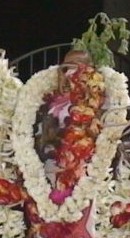
Tirunilakanta Nayanar, also known as Tirunilakanta, Nilakantan and Tirunilakantar (Thiruneelakandar) was a Nayanar saint, venerated in the Hindu sect of Shaivism. He is generally counted as the second in the list of 63 Nayanars.
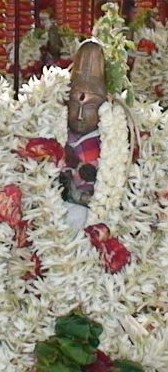
Tirunilanakka Nayanar, also known Tiruneelanakka, Nilanakkar and Nilanakkan, was a Nayanar saint, venerated in the Hindu sect of Shaivism. He is generally counted as the twenty-eighth in the list of 63 Nayanars. He is described as a contemporary of Sambandar, one of the most prominent Nayanars.






